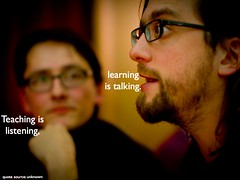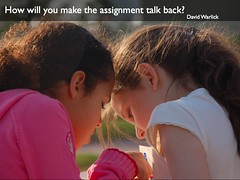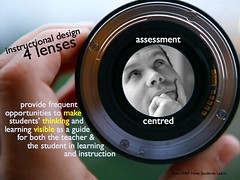 Image by dkuropatwa via Flickr ... about what you learned over the last three weeks.
Image by dkuropatwa via Flickr ... about what you learned over the last three weeks.Over the last three weeks you:
• decided on something you wanted your students more engaged in learning and thought about the second-order concepts they'll need to understand.
• listened in and (hopefully) participated in some passionate conversations with other teachers on twitter or blogs who want the same things for their students. Maybe you even had a good book suggested to you. (You got 5000 points if you read it!)
• searched for analogies to describe what people do and feel when they're engaged in learning something.
That completes the first of the five phases of Design; Discovery. Now we begin phase two; Interpretation.
Finding meaningful insights you can turn into actions is hard work. We'll take it in steps.
What was the most interesting conversation you heard or had yourself? What was most memorable? surprising?
What did people most care about? What motivated them? What frustrated them?
Did anything interesting come up about their environment or the context in which they teach?
Do you have any unanswered questions?
Recount the tale of one or more of these things. You know how when you come home at the end of the day you tell your family what happened at work? Or how you tell stories over coffee at work about things that happened to you yesterday? Tell a tale or two like that. And share it with someone. The more stories you can tell the better. Next week we'll dig into these stories and search for meaningful themes and insights.
You get 1000 points for each story you tell; to anyone. More storytelling is better; we learn best through stories. I know you're honest about keeping track. ;-)
Please share one or two of the stories you came up with this week in a tweet, a blog post, or leave a comment here or anywhere and include this tag in it somewhere: #wpedagogy
(This series of posts inspired by Design Thinking for Educators, 4.2.)
























